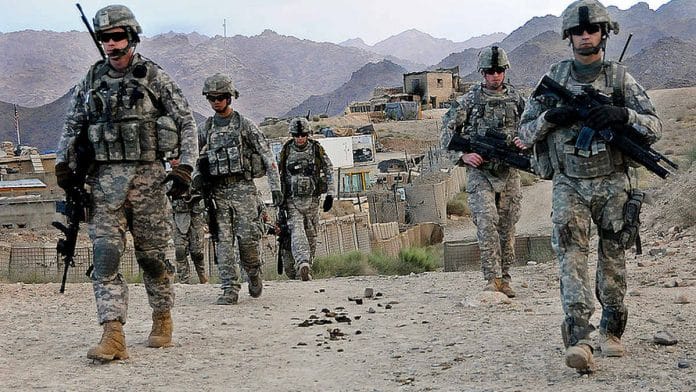Kabul: A Taliban official said signs that U.S. President Donald Trump will hasten the exit of all American troops from Afghanistan would force the country’s warring groups to finally negotiate peace, but experts worry the move may give the militant group the upper hand.
The group has welcomed Trump’s comments earlier this month about bringing remaining U.S. troops “home by Christmas,” while the Afghan government has expressed serious concerns about rising Taliban attacks and cautioned it against using violence as leverage in talks.
“The sooner the Americans leave Afghanistan the better it is for the Taliban and Kabul administration to succeed at the peace talks,” Taliban spokesman Zabihullah Mujahed said in a phone interview Sunday. “The Kabul administration views the presence of U.S. troops as essential for the survival of their power, and their withdrawal from the country would compel them to consider the peace talks as the last resort.”
The Taliban and the Afghan government are currently holding their first direct peace talks in Doha, Qatar, but despite negotiating for over a month the two sides are yet to reach an agreement on even the most basic issues. These include procedural rules and whether the February agreement between Washington and the Taliban should serve as the basis for talks.
Trump’s call for a faster exit has come as a surprise to both sides because the February peace deal had set plans for all American troops to withdraw by May 2021. Afghanistan is the site of the U.S.’s longest war, and 5,000 American soldiers are currently serving there. The conflict has killed tens of thousands of people and cost the U.S. almost $1 trillion since its invasion in 2001.
Fragile talks
Experts have said that continued violence enacted by the Taliban is a worry that would be exacerbated by the Americans leaving before the intra-Afghan peace talks make any real headway.
“Assuming the U.S. does withdraw by the end of the year it would seriously undermine the intra-Afghan dialog because the talks between the two sides are at an embryonic stage,” said Kamran Bokhari, the director for analytical development and a senior analyst on South Asia affairs at the Washington-based Center for Global Policy. “The Taliban obviously stand to benefit from such a move, with regards to their efforts to dominate a post-American Afghanistan.”
It’s a possibility that Mujahed himself alluded to in the interview.
In the unlikely event that talks fail and U.S. leaves Afghanistan, the Taliban’s spokesman warned the group would be compelled to continue the war to topple the current government and establish its own Islamic Emirate.
Taliban violence
Violence has continued to rise in the country already shattered by two decades of war.
The Taliban’s recent attacks in southern Helmand province lasted for days, resulting in heavy casualties to both the militants and government troops. Another suicide car bomb attack in Ghor on Sunday, which Kabul blamed on the insurgents, killed 15 people and wounded more than 80 others.
U.S. special envoy to Afghanistan, Zalmay Khalilzad, who mediated the intra-Afghan talks, also raised concerns in a series of tweets saying the “distressingly high” levels of violence threatened to undermine the talks.
On Saturday, government spokesman Sediq Sediqqi asked the Taliban to “immediately” stop their attacks nationwide, commenting in a video clip sent to reporters in Kabul.
“The presence of U.S. forces boosts the morale of Afghan security sector as they provide training and air support during battles,” said Nisar Ahmad Ghoryani, the head of the defense and security committee of the Afghan parliament, which looks at the country’s security. An early departure “could negatively impact the country’s war against the enemies as well as the prospects of peace with the Taliban.”
Apart from the president’s tweet the U.S. government is yet to give any details about a changed schedule of troop withdrawal.
“Given what is at stake, it is very difficult to see how the Trump administration will actually pull out so soon,” Bokhari said. “But in a scenario that it does, D.C. would leave behind a major strategic vacuum in the country that would lead to a collapse of the talks and intensified fighting between the two sides.” -Bloomberg






